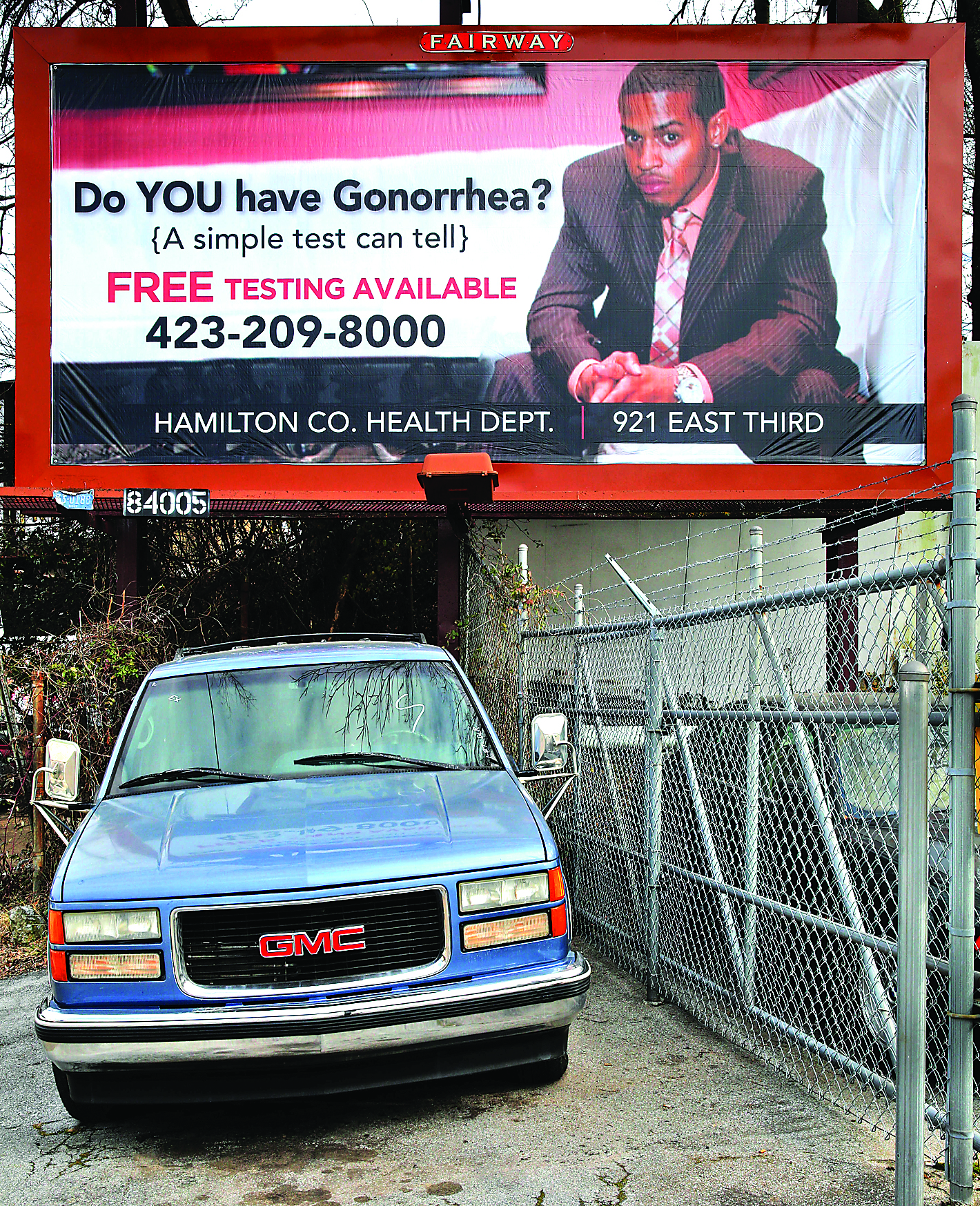AT A GLANCEThe following are state rankings for sexually transmitted diseases and number of cases. Rankings are based on rates per 100,000 population.AlabamaGonorrhea: 3rd worst in the nation; 9,270 casesChlamydia: 3rd worst in the nation; 30,621casesPrimary and secondary syphilis: 15th worst in the nation; 216 casesGeorgiaGonorrhea: 5th worst in the nation; 15,326 casesChlamydia: 8th worst in the nation; 52,418 casesPrimary and secondary syphilis: Worst the nation; 937 casesTennesseeGonorrhea: 9th worst in the nation; 9,098 casesChlamydia: 12th worst in the nation; 32,525 casesPrimary and secondary syphilis: 19th worst in the nation; 266 cases.Source: "Sexually Transmitted Disease Surveillance 2012" published by the U.S. Centers for Disease Control and Prevention, January 2014
TESTING AVAILABLEScreenings for sexually transmitted diseases are available at the Chattanooga-Hamilton County Health Department, 921 E. Third Street. Testing is confidential and may be free.To learn more, call 423-209-8250 or visit http://health.hamiltontn.org/clinicalservices/cds/STD.aspxThi
A question that's usually too embarrassing to ask even family members has begun confronting drivers across metro Chattanooga.
"Do YOU have Gonorrhea?" the billboards ask bluntly. "A simple test can tell."
The billboards, including 15 planned for Chattanooga over the next year, were commissioned by the Tennessee Department of Health as a part of a statewide public awareness effort focusing on sexually transmitted diseases and targeting metro areas across the state.
It's an important question to ask in this region, health officials say.
Tennessee, Alabama and Georgia are among the 10 worst in the nation for cases of gonorrhea and chlamydia, according to a study issued last month by the U.S. Centers for Disease Control and Prevention, which funded the billboards.
Numbers of chlamydia cases are the highest they have been in over a decade, the health department reports.
And compared to the four largest metropolitan areas in Tennessee, Hamilton County has the second-highest rate of STDs such as gonorrhea, chlamydia and syphilis, according to a 2010 report from the Chattanooga-Hamilton County Health Department.
In 2012, 1,974 cases of chlamydia and 646 cases of gonorrhea were reported in Hamilton County. Local rates for both diseases have risen in the last two years.
"Gonorrhea remains a troubling health issue across our state and disproportionately affects minorities," health department spokesman Woody McMillin said in an email. "We are optimistic the increased awareness will encourage people to be tested so the rate of disease can be reduced and, hopefully, one day eliminated."
Young people -- especially women -- and minorities have substantially higher rates of such infections.
The Chattanooga-based Ochs Center for Metropolitan Studies highlighted "substantial disparities by race and gender" in the rate of STDs in its 2013 State of the Chattanooga Region health report.
Overall, women were diagnosed with 72 percent of the county's chlamydia cases in 2011, the report found. Of those, 67 percent were black women. Among males, 72 percent of those who reported chlamydia cases were black.
Chlamydia and gonorrhea, both caused by bacteria, can go undetected for months or years. Chlamydia in particular can cause serious, permanent damage to a woman's reproductive organs.
In 2011, roughly 88 percent of gonorrhea cases in Hamilton County were found among black men, women and teens. Women accounted for about 61 percent of all reported cases.
McMillin said the state's Office of Minority Health works with groups to combat the number of infections among minorities, and it partners with universities to encourage and assist with STD testing.
The decision to feature a young black man in a suit and tie on the billboards is part of the effort to reach more at-risk demographics, McMillin explained -- citing the percentages of syphilis and gonorrhea among young people, in the black community and among men.
The locations of the billboards -- which will be rotated every month -- were determined based on the ZIP codes in each metro area with the highest number of cases of each STD the advertisement brings attention to.
Between 1999 and 2010, the number of reported gonorrhea cases in Tennessee fell from 11,840 per year to 7,121. But in 2012, it bounced back to 9,120.
"The number fluctuates from year to year -- providing evidence this is an ongoing challenge," he said.
Gonorrhea rates have dropped since the 1970s, but the CDC has noted a 4.1 percent increase since 2011, said Salina Smith, spokeswoman for the CDC.
Smith said the agency tracked more than 334,000 cases in its most recent reports but estimates the true count is closer to 800,000 new cases each year, with many going undiagnosed.
"The fact is that these can be largely asymptomatic, so people may not know they need to be tested," Smith said.
The infections can have permanent effects. The CDC estimates that undiagnosed STDs cause 24,000 women to become infertile each year.
Because of this risk, the agency urges annual screenings, especially for sexually active women, along with its recommendations for prevention: Abstinence, mutual monogamy and condom use.
It is "especially critical" for people to protect themselves against gonorrhea, Smith said, because the infection has become resistant to an increasing number of antibiotics traditionally used to fight it.
Last summer, the CDC changed its treatment guidelines in an effort to preserve what is currently the only effective treatment option, an injectable drug paired with two oral antibiotics.
Contact staff writer Kate Harrison at kharrison @timesfreepress.com or 423-757-6673.

